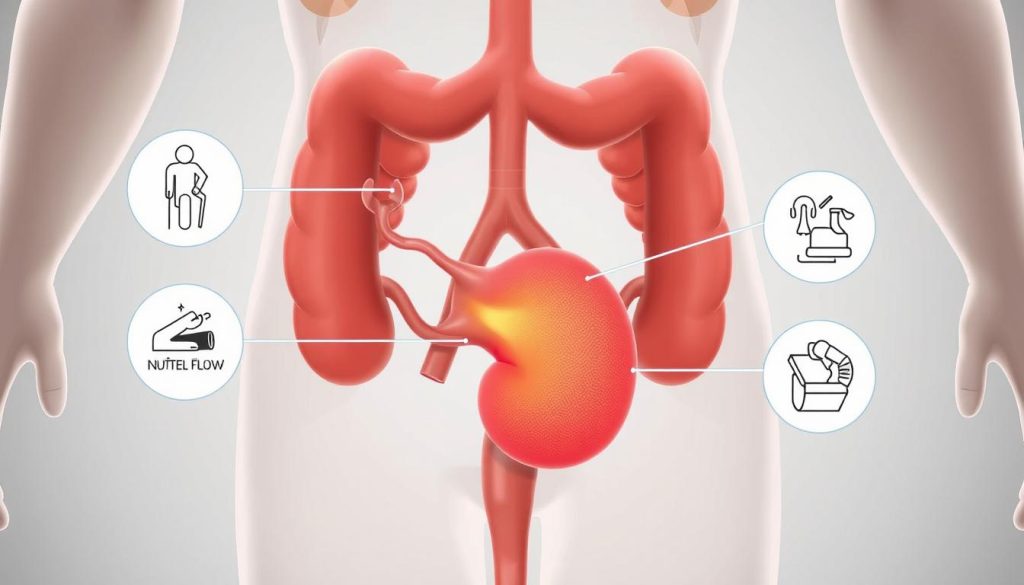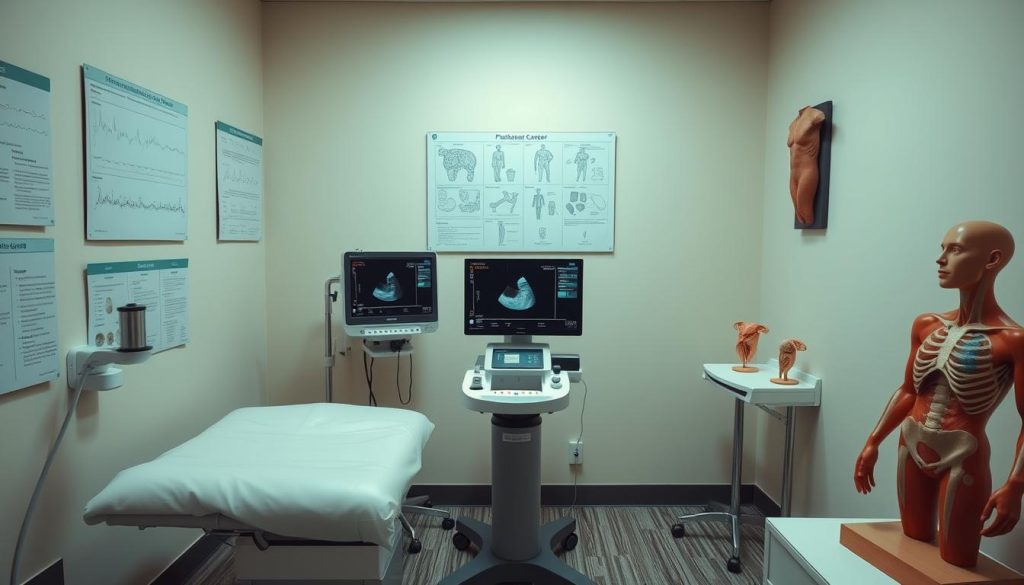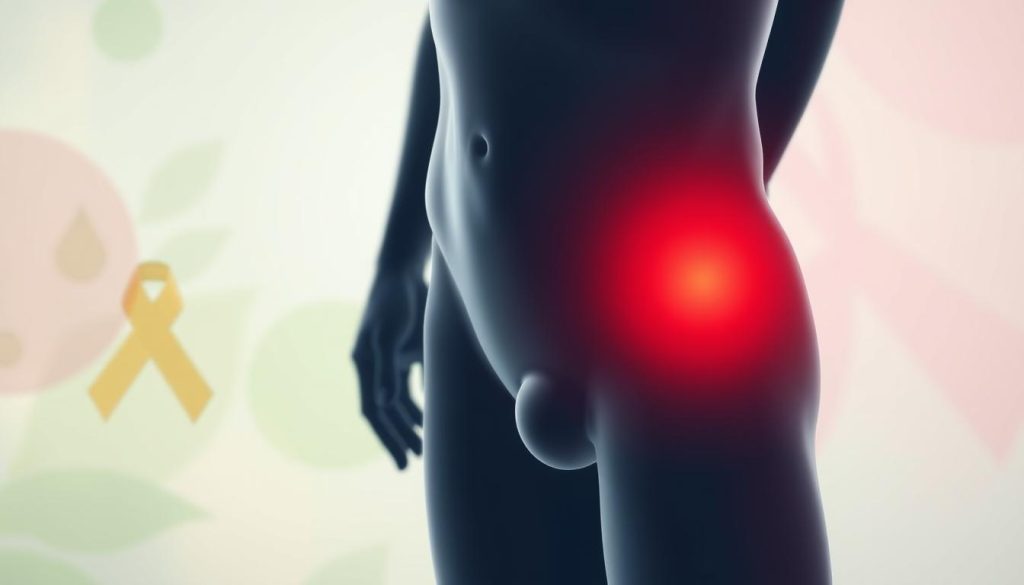Prostate cancer is a big problem for men all over the world. It’s important to know the early signs to get treatment quickly. This guide will help you understand what to look for.
Men over 50 need to watch out closely. Regular doctor visits and knowing the symptoms can help a lot. Knowing the early signs helps you take care of your health.
Now, let’s talk about the main signs and risk factors of prostate cancer. Knowing this information helps you keep your prostate healthy and stay well.
What Are Signs of Prostate Cancer: Initial Warning Signals
Spotting prostate cancer symptoms early is vital for treatment success. Many men notice small changes that hint at a need for doctor visits. Let’s look at important warning signs to keep an eye out for.
Changes in Urinary Patterns and Frequency
One early urinary issue in prostate cancer is a change in how often you pee. You might find yourself going more often, especially at night. This could mean the prostate is putting pressure on the urethra.

Difficulty Starting or Stopping Urination
Having trouble starting or stopping your urine flow is another common sign. You might notice a weak stream or feel like you can’t fully empty your bladder. These symptoms can be annoying and may get worse over time.
Blood in Urine or Semen
Seeing blood in your urine or semen is a concerning prostate cancer symptom. While it doesn’t always mean cancer, it’s a sign that needs quick medical attention.
Discomfort in Pelvic Area
Some men feel pain or discomfort in their pelvic area. This can be anything from a dull ache to sharp pain, especially when you pee or ejaculate. If you have ongoing discomfort, don’t ignore it.
Keep in mind, these signs don’t always mean you have prostate cancer. But, they do mean you should see a doctor. Catching it early is crucial for managing prostate health well.
Understanding Prostate-Specific Antigen (PSA) Levels
Prostate-specific antigen levels are key in prostate cancer screening. PSA is a protein made by the prostate gland. Its blood levels can show if there are prostate problems.
PSA testing isn’t the same for everyone. Normal levels change with age and other factors. A PSA under 4 ng/mL is usually normal. Levels between 4 and 10 ng/mL mean there’s a 25% chance of prostate cancer.
Many things can raise PSA levels, not just cancer. Conditions like prostatitis or an enlarged prostate can also increase PSA.
PSA testing is not perfect, but it remains a valuable tool in prostate cancer screening when used alongside other diagnostic methods.
PSA testing has helped find prostate cancer early. But, it’s also sparked debate. Some worry about finding cancers that don’t need treatment. Doctors often use PSA levels with other tests for a better picture.
If you’re thinking about prostate cancer screening, talk to your doctor. They can help you understand the benefits and risks of PSA testing. This will depend on your personal risk and health history.
Risk Factors and Early Detection Methods
Knowing the risk factors for prostate cancer is key to early detection and prevention. We’ll look at important factors that raise your risk and talk about screening methods.
Age-Related Risk Assessment
Prostate cancer risk goes up with age. Men over 50 should think about getting screened. African American men and those with a family history might need to start screening earlier, around 45.
Family History and Genetic Factors
Having a relative with prostate cancer doubles your risk. Certain genetic mutations, like BRCA1 and BRCA2, also raise your risk. If you have a strong family history, genetic counseling might be helpful.

Lifestyle and Environmental Influences
Your diet, exercise, and environment can affect your risk. Eating a lot of red meat and not enough fruits and veggies might increase your risk. Staying active and keeping a healthy weight can help lower your risk.
Screening Guidelines and Recommendations
Screening for prostate cancer usually involves two tests: the digital rectal exam and the PSA blood test. The American Cancer Society suggests talking to your doctor about screening at:
- Age 50 for men at average risk
- Age 45 for men at high risk
- Age 40 for men at very high risk
Regular screening can help find prostate cancer early, when it’s easier to treat. Discuss your screening schedule with your doctor based on your risk.
| Screening Method | Description | Frequency |
|---|---|---|
| Digital Rectal Exam | Physical examination of the prostate | Annually |
| PSA Blood Test | Measures prostate-specific antigen levels | Annually or as recommended |
Advanced Symptoms That Shouldn’t Be Ignored
Prostate cancer can get worse and cause more serious symptoms. It’s important to know these signs early. Men should watch for certain signs that show the disease is getting worse.
Bone pain in the hips, spine, or ribs is a warning sign. It might start as a dull ache and get worse. Losing weight without trying is another sign. It could mean your body is fighting cancer.
Fast or sudden erectile dysfunction is also a warning. This problem can have many causes. But if it happens fast and with other symptoms, see a doctor right away.
“Early detection of colon cancer significantly improves treatment outcomes. The same principle applies to prostate cancer. Being aware of your body’s changes is key to catching any potential issues early,” notes a health expert specializing in cancer awareness.
Other signs include feeling very tired, weak legs, and trouble with urination. These signs can come on slowly but shouldn’t be ignored. If you notice any of these, especially together, get medical help fast.
These symptoms are different from the early signs. They mean the cancer has spread. Acting quickly can help with treatment and improve your life.
Diagnostic Procedures and Next Steps
When doctors think prostate cancer might be present, they use several tests to confirm it. A major step is the prostate biopsy. This involves taking small tissue samples from the prostate gland. It helps find out if cancer cells are there and how aggressive they are.
Screening for prostate cancer starts with a PSA blood test and a digital rectal exam. If these tests show something unusual, doctors might suggest MRI or ultrasound. These imaging tests give clear pictures of the prostate. They help doctors spot any areas that need more checking.
After finding out about the cancer, patients work with their healthcare team to decide what to do next. The treatment depends on the cancer’s stage, how aggressive it is, and the patient’s health. Some might choose active surveillance, while others might need surgery, radiation, or hormone therapy. It’s important for patients to talk about all their options with their doctors.
It’s key to stay up to date on prostate health. Regular check-ups and talking openly with doctors can lead to early detection and better treatment. Remember, prostate cancer is often treatable if caught early. This shows how important it is to take care of your health proactively.
FAQ
Q: What are the most common early signs of prostate cancer?
A: Early signs include changes in how you urinate, trouble starting or stopping, and blood in urine or semen. You might also feel discomfort in your pelvic area. But, many men with early cancer don’t show any symptoms.
Q: At what age should men start getting screened for prostate cancer?
A: Men should talk to their doctor about screening at 50. But, if you’re African American or have a family history, start at 40-45.
Q: What is a PSA test and how is it used in prostate cancer detection?
A: A PSA test checks the PSA level in your blood. High levels might mean cancer, but can also be from other issues. It’s a screening tool, often used with other tests to check your prostate health.
Q: How is prostate cancer diagnosed?
A: Doctors use PSA tests, digital rectal exams (DRE), and biopsies to find prostate cancer. If they think you might have cancer, they might use MRI or CT scans to see how far it has spread.
Q: What are the risk factors for developing prostate cancer?
A: Risk factors include age over 50, being African American, family history, and certain genetic mutations. Diet and obesity might also play a part, but their exact role is unclear.
Q: What are the symptoms of advanced prostate cancer?
A: Symptoms include bone pain, unexplained weight loss, fatigue, trouble urinating, and blood in urine. These need immediate medical help.
Q: Is a prostate biopsy painful?
A: A biopsy might be uncomfortable but isn’t usually very painful. It’s done under local anesthesia. Some men might feel mild pain, bleeding, or discomfort for a few days after.
Q: Can prostate cancer be prevented?
A: There’s no sure way to prevent prostate cancer, but a healthy lifestyle can help. Eat well, exercise, stay at a healthy weight, and don’t smoke.
Q: How accurate is the PSA test in detecting prostate cancer?
A: The PSA test is useful but not 100% accurate. It can give false positives or negatives. It’s best used with other tests for better results.
Q: What should I do if I notice potential symptoms of prostate cancer?
A: If you notice symptoms like changes in urination or pelvic discomfort, see your doctor right away. They can check your symptoms and suggest tests or further exams.


















